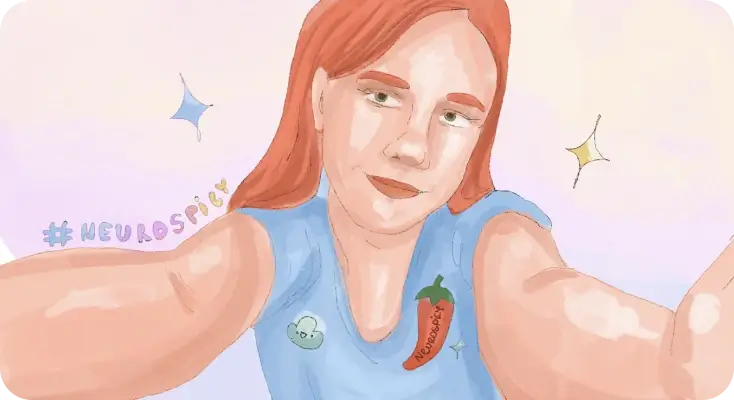TL;DR: Neurospicy brain
- “Neurospiciness” is a new term for “neurodivergence” intended to be light-hearted. It has gained popularity on TikTok.
- People may say “I am neurospicy” to highlight that they live with neurodivergent symptoms if they don’t want to use the term “neurodivergent.”
- The phrase “neurospicy brain” can help people feel more comfortable talking about their cognitive differences.
Neurospicy meaning in a nutshell
You’ve probably already faced TikTok videos with #neurospicy or seen a chili pepper picture on T-shirts, notebooks, or pins.
But what is neurospicy? Can someone explain what this term means and why everyone is talking about it? If you’ve ever faced questions like this, keep reading — this is the article you sought.
What does neurospicy mean?
Simply put, this term is another way to say “neurodiverse.”
It’s gaining popularity on social networks, as people find it rather empowering.
Saying, “I live with neurospicy symptoms,” or “I live with a neurospicy brain,” sounds more fun, simple, and approachable for some people.
What is a neurospicy person?
So, we understand that this quirky word is just a more playful way to describe a neurodivergent person. But let’s delve a little bit deeper.
“Neurospicy” has a metaphorical meaning:
- First, it evokes a typical aspect of online culture (especially among younger generations) to refer to something uncommon as “spicy.”
- Second, the chili pepper visual reference is meant to highlight the intensity of experiences.
- Third, the term is meant to refer to a variety of emotions and sensations much like spicy cuisine. This may include flavorful blends including tangy aspects, just as neurospicy individuals may experience “tangy” aspects of neurodivergent personality and thought, capturing their unique complexity.
Fun fact: “Neurospicy” may be one of the most widespread synonyms for “neurodiversity,” but it isn’t the only one. Some people also say that they are neuroatypical, neurodiverse, neurodistinct, neurowonderful, and more.
We asked Stephanie Palacios, PsyD, MFT, what using different terms like “neurospicy” or “neurowonderful” means to people. Here’s what she thinks, “From what I’ve seen, it seems like those who prefer to use “neurospicy” appreciate the casual and fun tone of the term, and for those individuals, it may help ease a sense of awkwardness in sharing their neurodivergence.”
Neurospicy VS. neurodivergent
“Neurodivergent” is an unofficial term people use to describe those whose brains work in a “non-typical” way.
As Dr. Stephanie Palacios states, “Neurodivergent’ is a fairly new umbrella term itself, yet social media has taken to the concept quickly, and new interpretations are now being highlighted as potential strengths. Even workplaces are already taking note of how neurodivergence can bring unique strengths to a team and organization. That’s the exciting potential future of the concept.”
So, why do we talk about “neurospicy VS. neurodivergent”?
For some people in the neurodivergent community, “neurodiversity” may sound too complicated and intimidating. The terms “neurospicy” and “neurospiciness” allow them to share their experiences in a way that feels more connected to everyday social-media lives.
This is what Reddit users say about the neologism:
- “It’s just a fun self-descriptor for NDs. I call myself neurospicy all the time.“
- “It plays into the idea that being neurodivergent is something cute and quirky.”
What about those who prefer “neurodivergent”?
“Neurospicy” is gaining popularity in some circles, it is doing so particularly among younger generations on social media, and it is not widely accepted by the neurodivergent community just yet.
There are those in the ND community who find “neurospicy” uncomfortable to use for its centering on pop culture and trendy language use. They prefer the more established (though still quite new) term “neurodivergent,” which is not shaped by social media trends. It also defines the community through the term itself — “neuro” and “divergent.”
Where’s the truth? It’s different for everyone.
The most effective and supportive thing you can do when communicating with people is to ask what words they prefer to describe themselves. This will be the most polite and caring approach.

In summary
You’ve discovered a lot about it in the previous sections, so now let’s sum up what we’ve learned.
“Neurospiciness” may be used as a celebration of a person’s identity. Stating that you’re neurospicy highlights that someone isn’t better or worse. They are just different.
By celebrating the differences, you can shine a light on the incredible strengths and talents that come with neurodivergence.
Disclaimer
This article is for general informative and self-discovery purposes only. It should not replace expert guidance from professionals.
Any action you take in response to the information in this article, whether directly or indirectly, is solely your responsibility and is done at your own risk. Breeze content team and its mental health experts disclaim any liability, loss, or risk, personal, professional, or otherwise, which may result from the use and/or application of any content.
Always consult your doctor or other certified health practitioner with any medical questions or concerns
Breeze articles exclusively cite trusted sources, such as academic research institutions and medical associations, including research and studies from PubMed, ResearchGate, or similar databases. Examine our subject-matter editors and editorial process to see how we verify facts and maintain the accuracy, reliability, and trustworthiness of our material.
Was this article helpful?






